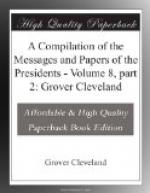FIRST INAUGURAL ADDRESS.
Fellow-Citizens of the United States:
In compliance with a custom as old as the Government itself, I appear before you to address you briefly and to take in your presence the oath prescribed by the Constitution of the United States to be taken by the President “before he enters on the execution of his office.”
I do not consider it necessary at present for me to discuss those matters of administration about which there is no special anxiety or excitement.
Apprehension seems to exist among the people of the Southern States that by the accession of a Republican Administration their property and their peace and personal security are to be endangered. There has never been any reasonable cause for such apprehension. Indeed, the most ample evidence to the contrary has all the while existed and been open to their inspection. It is found in nearly all the published speeches of him who now addresses you. I do but quote from one of those speeches when I declare that—
I have no purpose, directly or indirectly,
to interfere with the
institution of slavery in the States where
it exists. I believe
I have no lawful right to do so, and I
have no inclination to do so.
Those who nominated and elected me did so with full knowledge that I had made this and many similar declarations and had never recanted them; and more than this, they placed in the platform for my acceptance, and as a law to themselves and to me, the clear and emphatic resolution which I now read:
Resolved, That the maintenance inviolate of the rights of the States, and especially the right of each State to order and control its own domestic institutions according to its own judgment exclusively, is essential to that balance of power on which the perfection and endurance of our political fabric depend; and we denounce the lawless invasion by armed force of the soil of any State or Territory,




